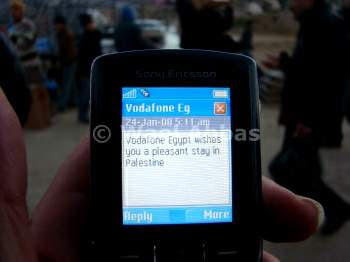 A question about alternative media in Cairo would probably prompt someone, say a university educated but underemployed 20-something in a cafe (too many fit the profile), to talk at length about blogging. About the blogs of students, journalists and activists who might identify as part of the Muslim Brotherhood (their official website, Ikwan Web, is very popular.) About the imprisonment of a former religious university student sent to jail for 4 years because of what he wrote about Islam and President Mubarak on his blog this time last year. Or about the English language blogs of a collection of high-profile bloggers, most independent reporters, among them the Arabist.net and 3arabawy, where one can always read up on struggling Egyptian workers' strikes (sometimes reported on via text message from another blogger on the scene) and, in the last few weeks, the impromptu market and mayhem along Egypt's temporarily-open border with Gaza.
A question about alternative media in Cairo would probably prompt someone, say a university educated but underemployed 20-something in a cafe (too many fit the profile), to talk at length about blogging. About the blogs of students, journalists and activists who might identify as part of the Muslim Brotherhood (their official website, Ikwan Web, is very popular.) About the imprisonment of a former religious university student sent to jail for 4 years because of what he wrote about Islam and President Mubarak on his blog this time last year. Or about the English language blogs of a collection of high-profile bloggers, most independent reporters, among them the Arabist.net and 3arabawy, where one can always read up on struggling Egyptian workers' strikes (sometimes reported on via text message from another blogger on the scene) and, in the last few weeks, the impromptu market and mayhem along Egypt's temporarily-open border with Gaza.Perhaps the most publicized blog from Egypt in the international press is MisrDigital (some of it's in English), where photojournalist Wael Abbas has been posting leaked vidoes of police brutality and torture (many shot on cellphones) for well over a year. YouTube tried to pull his account late last year (Google strikes again, possibly bowing to calls to limit political dissent in countries like Egypt and Turkey) only to re-neg and allow him his own channel! Recently Abbas, like many other Egyptian journalist/activists, traveled from Cairo to Gaza to report firsthand the scene along with breached border (photo above). He's won a series of reporting awards, been interviewed on Al Jazeera and CNN, but just hopes he won't be arrested by his draconian government.
That's the biggest question with all of the opening up of what reporter Hossam el-Hamalawy, who runs the blog 3arabawy, described to me last year as this new kind of "citizen journalism." Blogging in Egypt as a political act took off with major protests after another round of rigged referendums and presidential elections in 2005, when a more coherent and collective opposition movement, ("Kifaya," Arabic for "Enough!") began making its name heard, most often through the channels of blogging and the independent print media. Where it ends has as much to do with repressive state politics in Egypt, and the increasing worry that companies like Google, which control sites like YouTube, will let online access get entangled in politics and international diplomacy.
The US gives Egypt a greenlight for mass arrest and torture of men believed to be associated with the Muslim Brotherhood; Egypt's doing the dirty work against Islamism, so they say, even if the Brotherhood rejected violence decades ago and is a (tacitly) tolerated political party in Egypt now. Who are some of the casualties? For one, a law-school graduate and blogger named Abd al-Menim Mahmoud, representing the more progressive side of the Muslim Brotherhood (“what I reject is not liberalism as a political ideology, but Western foreign policy") whose already gone to jail numerous times for what he writes online.
- freddy
No comments:
Post a Comment